Related Research Articles

Don Pasquale is an opera buffa, or comic opera, in three acts by Gaetano Donizetti with an Italian libretto completed largely by Giovanni Ruffini as well as the composer. It was based on a libretto by Angelo Anelli for Stefano Pavesi's opera Ser Marcantonio written in 1810 but, on the published libretto, the author appears as "M.A."
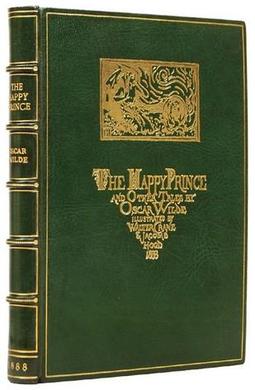
The Happy Prince and Other Tales is a collection of stories for children by Oscar Wilde first published in May 1888. It contains five stories: "The Happy Prince", "The Nightingale and the Rose", "The Selfish Giant", "The Devoted Friend", and "The Remarkable Rocket". in 2003, the second through fourth stories were adapted by Lupus Films and Terraglyph Interactive Studios into the three-part series Wilde Stories for Channel 4.

Undine is a fairytale novella (Erzählung) by Friedrich de la Motte Fouqué in which Undine, a water spirit, marries a knight named Huldbrand in order to gain a soul. Published in 1811, it is an early German romance, which has been translated into English and other languages.

Louise is a “musical novel,” or “roman musical,” in four acts and five scenes by Gustave Charpentier. It can be considered an opera. The composer himself penned the French libretto with contributions from Saint-Pol-Roux, a symbolist poet and inspiration of the surrealists. It is an atmospheric story of working-class life in Paris, with the city itself invoked along the way: young Louise, a seamstress living with her parents, loves Julien, an artist; she desires freedom, associated in her mind with him and the city. Musically the work is verismo, it marks the beginning of naturalism in French opera.
Strange Pilgrims is a collection of twelve loosely related short stories by the Nobel Prize–winning Colombian writer Gabriel García Márquez.
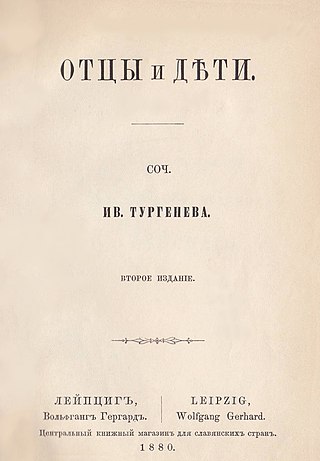
Fathers and Sons, literally Fathers and Children, is an 1862 novel by Ivan Turgenev, published in Moscow by Grachev & Co. It is one of the most acclaimed Russian novels of the 19th century.
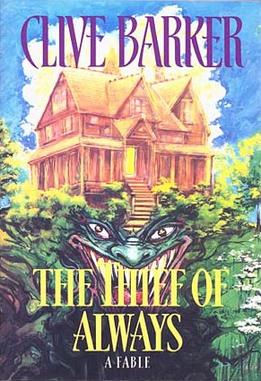
The Thief of Always is a novel by Clive Barker that was published in 1992. The book is a fable written for all ages. Its cover was created by Barker, and the book contains several black and white illustrations by him.

Kurt Gerron was a German Jewish actor and film director. He and his wife, Olga were murdered in the Holocaust.

The Song of the Lark is a novel by American author Willa Cather, written in 1915. It is her third novel to be published.

Ivan the Fool, composed in 1913 by César Cui, is an opera-fairytale made for children in three tableaux. The libretto was written by Nadezhda Nikolaevna Dolomanova using Russian folk tales.

Danny's Nanny was a 1988-1994 comic strip in The Beano, drawn by David Mostyn. It features the young toddler and his nanny, a dog, which bore some resemblance to a sheep with a very long coat.
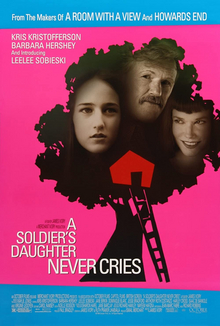
A Soldier's Daughter Never Cries is a 1998 drama film directed by James Ivory from a screenplay he co-wrote with Ruth Prawer Jhabvala. It stars Kris Kristofferson, Barbara Hershey, Leelee Sobieski and Jesse Bradford. The film is a fictionalized account of the family life of writer James Jones and is based on Kaylie Jones' novel of the same name.

The Adventures of Tom Sawyer is a musical comedy based on the 1876 novel by Mark Twain conceived and written by Ken Ludwig, with music and lyrics by Don Schlitz. The musical is the story of a fourteen-year-old boy growing up in the heartland of America. This Broadway musical version of Mark Twain's novel is set in 1840 in St. Petersburg, Missouri, a bustling town on the banks of the Mississippi River. In the course of the story, Tom matches wits with his stern Aunt Polly, falls in love with the beautiful, feisty Becky Thatcher, and goes on the adventure of his life with Becky and Huckleberry Finn. Along the way he meets a terrifying villain named Injun Joe, Tom's bratty half-brother Sid, and all the other boys and girls in the village.

The Wicked World is a blank verse play by W. S. Gilbert in three acts. It opened at the Haymarket Theatre on 4 January 1873 and ran for a successful 145 performances, closing on 21 June 1873. The play is an allegory loosely based on a short illustrated story of the same title by Gilbert, written in 1871 and published in Tom Hood's Comic Annual, about how pure fairies cope with a sudden introduction to them of "mortal love."
Ofer Ben-Amots is an Israeli-American composer and teacher of music composition and theory at Colorado College. His music is inspired by Jewish folklore of Eastern-European Yiddish and Judeo-Spanish Ladino traditions. The interweaving of folk elements with contemporary textures creates the dynamic tension that permeates and defines Ben-Amots' musical language.

Blindekuh is an operetta written by Johann Strauss II on a libretto by Rudolf Kneisel. It was first performed in Vienna at the Theater an der Wien on 18 December 1878, its composition delayed by the death of Strauss' wife, Jetty Treffz. The overture was performed earlier at a charity event. The first run lasted sixteen performances, followed by performances in Hungary. The overture established itself in the repertoire of many orchestras and is often performed nowadays.
Shake, Rattle & Roll VI is a 1997 Filipino horror anthology film and the sixth installment of the Shake, Rattle & Roll film series. It was distributed by MAQ Productions. It is directed by Maurice Carvajal, Anton Juan, and Frank Rivera. The film is not an entry to the Metro Manila Film Festival unlike other installments, but it was meant to be an entry in the 1996 Metro Manila Film Festival.
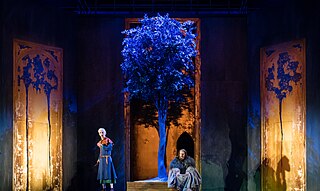
Written on Skin is an opera by the British composer George Benjamin.

Paradises Lost is a science fiction novella by American author Ursula K. Le Guin. It was first published in 2002 as a part of the collection The Birthday of the World. It is set during a multigenerational voyage from Earth to a potentially habitable planet. The protagonists, Liu Hsing and Nova Luis, are members of the fifth generation born on the ship. The story follows them as they deal with members of religious cult who do not believe in the ship stopping at its intended destination. They also face a crisis brought on by a drastic change in the ship's schedule. The novella has since been anthologized as well as adapted into an opera of the same name.

"About Love" is an 1898 short story by Anton Pavlovich Chekhov. The third and final part of the Little Trilogy, started by "The Man in the Case" and continued by "Gooseberries". It was first published in the August 1898 issue of Russkaya Mysl, and later included into Volume XII of the second, 1903 edition of the Collected Works by A.P. Chekhov, published by Adolf Marks.